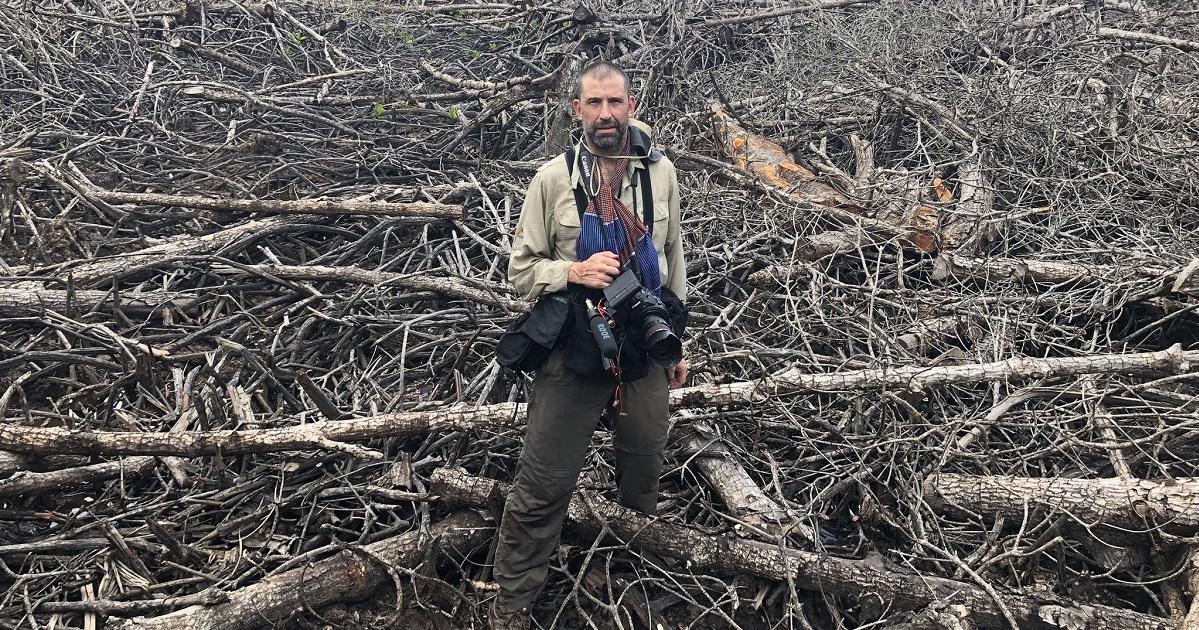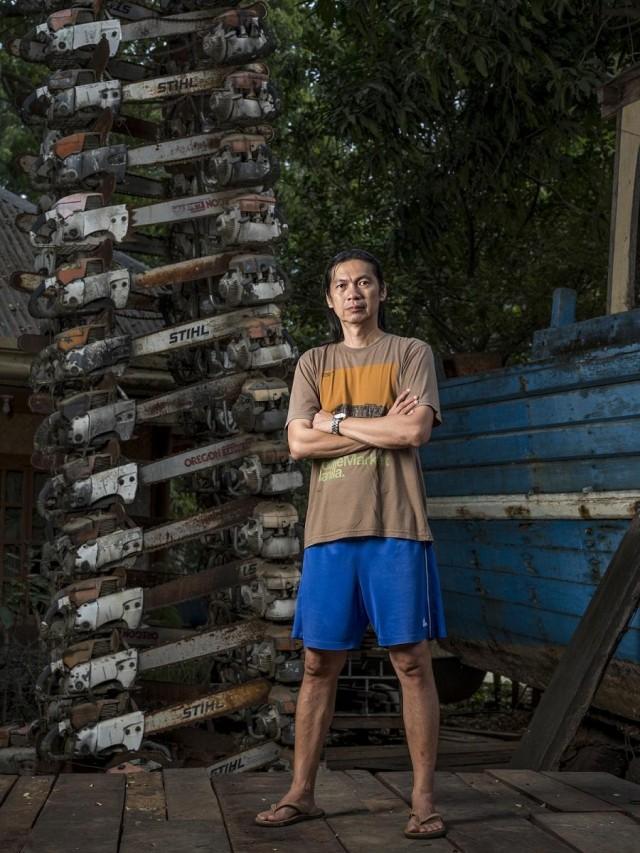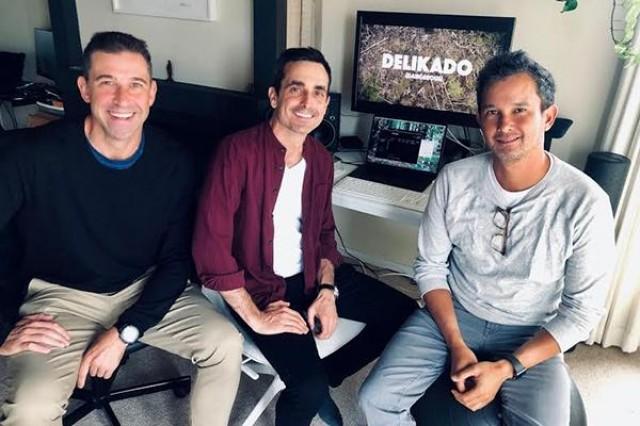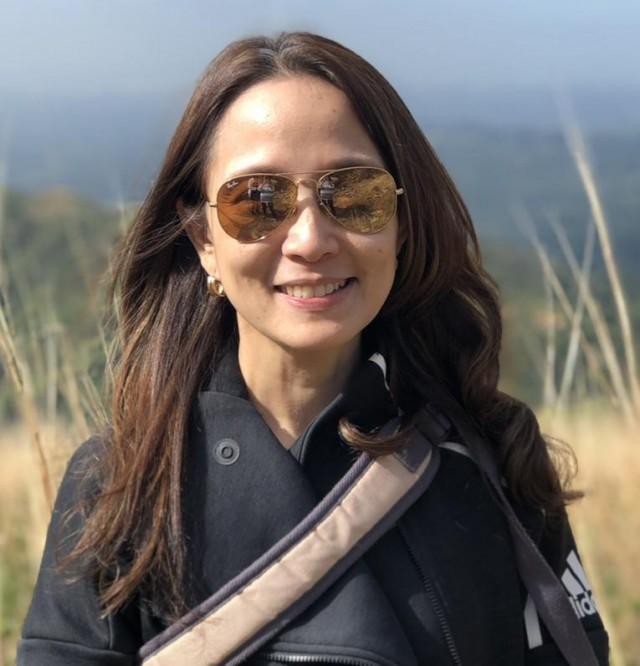Journalist-turned-filmmaker Karl Malakunas and producers talk of Palawan documentary 'Delikado'

LOS ANGELES — Palawan has always been chosen by the top travel magazines as the best island in the world with its pristine waters, diverse and large rainforests, and beautiful and unique tropical fishes.
It took an Australian Agence-France Presse (AFP) journalist, Karl Malakunas, who was then based in Manila in 2011, to be inspired to make a documentary on the illegal logging and fishing going on in Palawan.
"I was going to do a story on ecotourism down in Palawan. It was just an innocuous story just to go down and see how beautiful it was. But the environmental campaigner, my contact for that story was shot and killed just before I was about to go down. That was Doc Gerry Ortega, back in 2011," he said.
"I went down to Palawan to report on his murder, investigate his murder. While I was there, I discovered that it wasn't just Doc Gerry who was fighting to protect Palawan's spectacular natural resources. There was a whole bunch of very brave, courageous land defenders who were risking their lives to try and protect Palawan's forests, its mountains, and its seas, from being destroyed. I was immediately very inspired by them."
The result of his years of researching, documenting and investigating is the eye-opening documentary"Delikado," which he produced together with Marty Syjuco, Michael Collins and Kara Magsanoc-Alikpala.

"There was one person in particular who was very charismatic, who jumped out as someone who would captivate other people's attention. And that was attorney Bobby Chan, of the Palawan NGO Network Inc, PNNI, and Bobby had a tree made of chainsaws out the front of his office," Karl said.
"I said, 'What are those chainsaws about?' He told these stories about how these community members would go out into the forests in barefoot or in flip flops and effectively use the Citizen's Arrest law to go and affect citizens arrests, not on the people themselves, but on the equipment that they were using. They would confiscate these chainsaws from illegal loggers. These chainsaws would come back, and he would put this up as a tree, as a statement, as a symbol to people in Palawan. To everyone else, 'Don't be afraid. I'm not afraid of the threats and intimidation.' I thought that was a pretty dramatic start to an idea for a film. And that's how it began."
We were able to interview Malakunas virtually and the producers by e-mail. Below are excerpts of our conversation.
Karl Malakunas (director, writer, producer)
Can you describe how long you've been doing the research and documenting on this project and what were the challenges? I know you were sleeping in the forest with the barefoot para-enforcers.
2011 was when I first went down to Palawan. Then it took a few years for the idea to develop and for me to be able to start filming. 2017 was when the filming really got underway. We were back there repeatedly between 2017 and up until the end of the pandemic effectively. We spent a few years going back and forth, spending a long time with the para-enforcers, also with Nieves Rosento, another character in the film and traveling all around Palawan.
The challenges were trying to keep up with Tata and the team. They are incredibly fit. They may have been in flip flops and bare feet, and didn't have very much food with them, didn't have any protective equipment, but boy, they were tough. Trying to keep up with them, going up the mountains was incredibly tough. Sleeping out in the forest with them was incredibly tough, but it was amazing to experience that with them. I was very lucky.
Were you also barefoot like them? Did you eat the same food that they ate and were you ever scared for your life?
My feet aren't as tough. I was wearing hiking shoes and they would effectively get destroyed far faster than the flip- flops that the para-enforcers were wearing. They don't get foot injuries. They've become accustomed to it and they're very tough.
We ate with them, and we lived with them for a long time, so that was one of the joys of sitting in the forest and eating. They don't have a lot of luxuries or food. It was rice and fish and canned food. They perform heroic missions on little sustenance. I had to drink a lot more water than them. I couldn't drink enough water, but they can go on just a little bit. I felt confident in the way that they operated inside the forest.
We understood that there were dangers. They're incredibly experienced and they have their own training, and they work incredibly well there. With them in the forest, some fear, but it was also, again, just feeling very lucky and privileged to be with them. They have a great camaraderie together, and it's a sense of adventure in the forest with them.
Can you describe a little bit about the people in the film, like Bobby Chan, Nieves Rosento and Tata? How much did you know about them?
I got to know them all very well over the years. Bobby is a very charismatic man, has a great sense of humor, and is a strong leader. He's very strong with his ideas, and he's deeply impacted by his religious calling and his background. He grew up with the Jesuit education. He's very strong and very special in that way. He's also one of the boys. He'd sing karaoke and sit around at the headquarters. He very many loves being with his team members.
I met Nieves Rosento when I went to the funeral of one of the para-enforcers who was shot and killed in the mountains near El Nido. Nieves was one of his friends. She's a longtime environmental campaigner and she spoke at his funeral. She was at his coffin with his daughters, as the coffin was being taken into the ground. That's where I met Nieves. Her conviction for the environment is unwavering. She's faced some very strong threats and her ability to face those threats and continue, is extremely strong and powerful.
Tata is a wonderful man. He's a grandfather, he's a farmer, he's a man of the earth. He had his military training back in the day. We learn in this film that he says that he was involved with the illegal logging, through these official channels many, many years ago. He's looking for redemption and that's what pushes him through the forest, this redemption. I found that a very, very powerful story.
Can you talk a little bit about Kap (short for Kapitan) Ruben Arzaga, who was shot and killed? Did this happen when you were with him and the land defenders? Can you give an update on the case?
I met Kap in one of the missions and we went into the forest near El Nido. And he, Tata, and others, slept in the forest for a couple of days tracking the illegal loggers. They got in and they confiscated two chainsaws from around the forest El Nido. I interviewed him in the forest at that time. I asked him why he was doing it. He said that he was doing it so when his daughters grow up, all the big trees won't be gone, that they will still be there. He was a very humble man, and he was driven by this desire to protect his local environment for his family. It's still hard to talk about it because, six months later, he was shot and killed in the forest, near El Nido, doing the same thing. To see his daughters bury him was just tragic.
When was the last time you were in Palawan?
Just before the pandemic. I haven't been able to get back since the pandemic.
You were a journalist, and now you're a director, a filmmaker. How was the transition for you and what was the most challenging?
I'm still a journalist and still working here based in Hong Kong. The challenge is over the past few years, has just been trying to manage the team of editors and the whole post-production team remotely during the pandemic. We've had editors in America and in Australia, our team's all around the world. It has been a challenge in that respect.
In terms of the storytelling, it's obviously a much more complex way of delivering the story, yet at the same time, the core of it is still very much the same. I think the strength of journalism, or the strength of filmmaking is in the characters and telling their story. I did articles on the para-enforcers for AFP back in 2017. The core and the essence of the story is still very, very much the same. It's just a much, much more complex way of presenting it.

How did you meet Marty Syjuco, Michael Collins, and Kara Magsanoc-Alikpala?
I met Marty and Michael initially through their first film on the Philippines called "Give Up Tomorrow." Through my work as a journalist, I interviewed them and got to know about what they were trying to do with the impact of the film after it came out. We became friends. Marty was coming through the Philippines; we became friends and then that's how our relationship developed. Marty and Kara have collaborated on films together and I was lucky enough to be introduced to Kara through Marty and Michael.
Has this film been shown to the government officials and what do you think would be the reaction?
No, it hasn't yet been shown to the government officials. We did endeavor to get their side of the story. So how will they see it? I guess I can't comment too much about that. I hope that people will see this film. We've endeavored to apply journalistic standards and it's a very fact-based approach to the film. I hope it will be seen through that lens.
Bobby Chan's legacy, do you think it will continue or has it stopped after they confiscated all the chainsaws?
If you go to the PNNI (Palawan NGO Network, Inc.) Facebook page, you'll still see that the para-enforcers, with very little money through the pandemic have still been going out into the forest and confiscating chainsaws. A lack of money is a hindrance, but it won't stop them. They're still fighting on. Bobby really is driven by the belief that you take one chainsaw out of the forest and that chainsaw is not going to be cutting down those trees. They're still striving to do that, one chainsaw at a time.
What do you hope this documentary will do to audiences who will watch it?
I hope that it will obviously raise awareness and understanding about what is happening in Palawan. Whether it's for people from the Philippines or abroad, there is an image of this incredibly beautiful, wonderful place. It certainly is. There are these other elements that I guess we are showing in this film that they don't might not necessarily know about. If they see that and they want to be better educated about where the wood is coming for the tourist resorts, what is happening to the corals, rather than just enjoying its beauty, but working themselves to try and protect it, doing something to protect it.
More broadly, the story of Bobby, Tata and Nieves is not an isolated story. In fact, their struggles are the same struggles that land defenders are having in Brazil, in Colombia, in Honduras, all around the world. Land defenders are being killed in record numbers around the world. 227 land defenders were reported killed in 2020. Each year, that's a record. Each year it goes up.
There's been an average of four land defenders killed every week since the 2015 Paris Climate Change Accords were signed. When you think about this around the world, land defenders are on the front lines of our battle to fight climate change and to save our biodiversity. The struggles of Bobby, Tata, Nieves, land defenders around the world are so crucial to all of us living in a planet that has restrained climate change. I hope that this will help to raise awareness about these issues, not just in Palawan and the Philippines, but globally, and be used to help drive messages to protect and empower land defenders around the world.
This documentary is going to have its world premiere at the Hot Docs Festival in Toronto, Canada ahead of the Philippine National Elections on May 9. Was there a reason for this? What's the significance of that date?
There was no significance on our behalf. We left it to the fate of the festival gods. We submit to the festivals and get selected or not as the case may be. We were lucky enough to get selected by Hot Docs and the date, whether it coincided with the elections, wasn't really a part of that consideration.
Are you now inspired to do more documentaries or films? What kind of films are you planning to do?
I would. Yes, I'm definitely inspired to do more. It's been an amazing journey and I hope I can make more films. I would like to continue my themes about the environment and climate change, and also trying to present stories of hope and inspiration, which I believe even with all the challenges that are... Well, maybe because of all the challenges we are showing in our film, it really is one that people can watch and come away with a feeling of being inspired by the subjects.
I would like my other films to also have positive messages that can inspire and for people to do something to protect our planet, our environment, because I guess I know as a journalist, it's constant driving of bad messages, all the doom and gloom. People turn off, don't they? They don't want to just hear how bad things all the time are. The challenge is to try and show films and messages of hope and inspiration.
It's also Earth Month, so it's just perfect to be shown.
Yes, that is good timing.
Do you see yourself doing another collaboration with Marty, Michael, and Kara?
Sure, that could certainly be on the cards. To be honest, I haven't looked further than the next couple of weeks. We've really just finished the making of the film. We're in the whirlwind of getting this out to the world, but afterwards, I'd love to make a film and they've been an amazing team to work with. I'd certainly love to consider that again.
In what other film festivals is this documentary participating?
There's going to be a series of them throughout America, throughout May and June. In New York, there's the Human Rights Watch Festival. There's Mountain Film in Colorado and then we have other festivals in Asia Pacific and hopefully in Europe, in the second half of year.
May I also ask your heritage? Malakunas sounds Tagalog or Filipino.
Yes, I got that a lot. No, it's Lithuanian actually, Lithuanian heritage. Some people say it like Malakas (strong), but no, it's not.
Do you know any Tagalog words now since you've been to the Philippines for a long time?
Konti lang. (Just a little bit.)
Michael Collins, Marty Syjuco and Kara Magsanoc-Alikpala (producers)

Why are you passionate about this project and how did you get involved?
Michael Collins (MC): It is no longer hyperbolic to say that there is a war being waged against the earth that we are dangerously close to losing. Land defenders in particular are on the front lines and dying in battle every day. When Karl approached me to join this team, I was grateful to play any part in sharing their inspiring stories, and hopefully creating a catalytic piece of media and impact campaign that will help to change the narrative around climate change.
Kara Magsanoc-Alikpala (KMA): I've inherited my parents' love for trees. We've always been surrounded by trees at home. Whenever I get on a commercial flight, I can easily spot our house because we have the most trees in the village. At one point one of our narra trees grew so tall and its roots so widespread, it was ready to topple our house. The tree doctor told us to choose who stays—our house or the tree. We couldn't, we chose both.
But it's embarrassing to admit, I never stopped to think what life is like for the guardians of our forests. Marty Syjuco and Michael Collins, my co-producers, invited me to the project. In 2018, Global Witness reported that the Philippines had the highest number of killings of land and environmental defenders. That grabbed my attention, angered me and made me want to join the production team. I didn't want the words illegal logging, land defenders to be abstract concepts to people, the way it has been for me. I wanted a face and feeling to these concepts, so people live more consciously, are more pro-active in protecting our forests and the land defenders. This project in a way is a tribute to my parents who always considered trees priceless members of our family.
Michael, aside from being the producer, you are also the writer and editor of the documentary. What were the challenges you encountered being the writer, and also as the editor?
MC: There are many challenges I anticipate when diving into the edit of a feature documentary. The sheer volume of footage to sort through, the time and space to get to know characters, where they come from and why they do what they do, then figuring out how much of that makes it to the screen. This becomes more difficult when following three main subjects as we have in "Delikado," and finding key moments when their stories, as well as the overall plot, can intersect. Karl's vison, along with veteran storytellers Laura Nix and Eric Metzgar, kept us on track.
One unique challenge we faced throughout the edit was dealing with the death of one of our subjects who was murdered quite early in production. We felt it was important to feel this loss personally and not just witness it as a tragedy from afar. That ultimately meant getting to know and care about our other characters, so we experienced the loss from their perspective.
It took four years to do this film. What were the hurdles that you have to go through to finish it?
MC: The biggest challenge that I'm sure many filmmakers can relate to recently, was editing and completing post during the pandemic. Being unable to be in the same physical space as Karl and our other collaborators certainly made the process much more arduous. And as a producer, I was also feeling the pinch as our timeline and budget continued growing.
In doing this project, did you meet and get to know as well Bobby Chan, Nieves Rosento and Tata? Please tell us more about your meeting with them.
KMA: Tata is like the salt of the earth. He is kind and gentle even when he apprehends an illegal logger or fishermen who use cyanide to catch fish. He has a boundless sense of respect and wonder for anything environment.
In the film, you'll see him as the face of courage and leadership. Yet when I watched him and his family watch a rough cut of our film, he was like a child, excited and in awe. He was embarrassed by the attention. He didn’t think his life story was worth sharing with an audience. I guess he never realized how big a deal his mission and vocation were till we showed him how big a deal it was for us. His daughter and wife were beaming with pride. But, of course, his wife couldn’t help but express how knowing what he does makes her more nervous whenever he leaves for the forest. But her pride for Tata's commitment to protect the forest and all living beings dependent on it, was bigger than her fear.
What do you hope audiences and the government will get after watching this?
MC: I hope audiences feel the connection to the earth and a responsibility to protect it the same way Tata, Nieves and Bobby do. And that they walk away feeling empowered to stand up to political and corporate corruption and greed. I hope those in government manipulating the laws, exploiting indigenous communities and treating nature as an endless commodity for profit, realize they are being watched and will be held responsible eventually. And to those in government who are environmentally minded, I hope they are energized to continue the fight, rallying their colleagues by demonstrating that a healthy and thriving environment goes hand-in-hand with a healthy, thriving population and economy.
—MGP, GMA News




